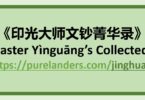至诚恳切,阅经看注
[218] [With] Earnestness [And] Utmost Sincerity, Read [The] Sūtras [And] See Commentaries
至于阅经,若欲作法师,为众宣扬,当先阅经文,次看注疏。
As for reading [of] sūtras, if desiring [to] be Dharma teachers, for all propagating [them, there] should first [be] reading [of the] sūtras’ text, next looking [at their] commentaries [and] sub-commentaries.
[Note 1: Doing the first is to attempt to connect to the Buddha’s teachings directly, while doing the latter is to further understanding of them. For accuracy of meanings, only appropriate (sub-)commentaries by Great Masters and teachers should be studied.]
若非精神充足,见解过人,罔不徒劳心力,虚丧岁月。若欲随分亲得实益,必须至诚恳切,清净三业。
If not [with] vitality abundant, [and with] views [and] understanding surpassing people, not [having those] not [with] futile efforts [of] mental [and] physical efforts, emptily losing years [and] months. If desiring [to] according [to one’s] part personally attain true benefits, [there] must [be] earnestness [with] utmost sincerity, [and] purification [of the] three karmas.
[Note 2: To have purity of the three karmas (三业) is to have body, speech and mind (身口意) without evil, by not breaking precepts (戒).]
或先端坐少顷,凝定身心,然后拜佛朗诵,或止默阅,或拜佛后端坐少顷,然后开经。必须端身正坐,如对圣容,亲聆圆音,不敢萌一念懈怠,不敢起一念分别。从首至尾,一直阅去,无论若文若义,一概不加理会。如是阅经,利根之人,便能悟二空理,证实相法。即根机钝劣,亦可以消除业障,增长福慧。
Perhaps first [with] upright sitting [for a] short while, [with] calming [and] concentrating [of the] body [and] mind, afterwards bowing [to the] Buddha, reciting aloud, or only [with] silent reading. Perhaps after bowing [to the] Buddha, [with] upright sitting [for a] short while, afterwards opening [the] sūtra. [There] must [be the] upright body sitting straight, like facing [the] noble [one’s] countenance, personally listening [to his] perfect voice, not daring [to] sprout one thought [of] laziness, not daring [to] give rise [to] one thought [of] differentiation. From [the] beginning to [the] end, continuously reading away, regardless [of the] text or meaning, similarly not [giving] additional attention. Like this reading sūtras, of people [with] sharp roots, [they will] then [be] able [to] awaken [to the] two emptinesses’ principles, [to] realise true form’s Dharma. Even [if with] roots [and] capacities dull [and] inferior, [they] also can eliminate karmic obstacles, [to] increase [and] grow blessings [and] wisdom.
[Note 3: With sitting upright, this helps to upright one’s mind (正其心). With calmness comes clarity. With bowing, this expresses reverence (恭敬). With reciting aloud, this expresses more deliberation. With silent reading, this allows more internalisation. With not giving rise to differentiation, this allows taking in the teaching as it is, the meaning of which can arise naturally and intuitively in the mind, then or later.]
[Note 4: The two emptinesses (二空) are self emptiness (我空) and dharmas’ emptiness (法空). ‘Dharmas’ are external phenomena of mind and matter. Oneself and dharmas are empty of any substantial unchanging mind and matter, that can be called a ‘true self’ or ‘true dharma’. True form (实相) is this reality to be realised.]
[Note 5: As reading and reciting sūtras create much meritorious virtues (功德), these are able to eliminate karmic obstacles, and grow blessings and wisdom.]
六祖谓:「但看《金刚经》,即能明心见性。」即指如此看耳,故名曰「但」。能如此看,诸大乘经,皆能明心见性,岂独《金刚经》为然?
[The] Sixth [Chán] Patriarch said, ‘Only seeing [the] Vajra Sūtra, [one is] immediately able [to, with a] clear mind see [one’s] nature.’ Then pointing [out] like this seeing, thus calling [this] ‘only’. [If] able [to] like this see, all [the] Great Vehicle’s sūtras, all [are] able [to, with a] clear mind see [one’s] nature. How [is this] only [for the] Vajra Sūtra as thus?
[Note 6: As all the Great Vehicle’s sūtras contain teachings that enable the seeing of one’s nature, this is so.]
若一路分别,此一句是甚么义,此一段是甚么义。全属凡情妄想,卜度思量。岂能冥符佛意,圆悟经旨,因兹业障消灭、福慧增崇乎?智者诵经,豁然大悟,寂尔入定。岂有分别心之所能得哉?
If along the way differentiating, ‘This one line is [with] what meaning?’, ‘This one paragraph is [with] what meaning?’, [these] completely belong [to] ordinary passions [i.e. feelings and desires], deluded thoughts, speculations, assumptions, considerations [and] measures. How [are these] able [to] secretly correspond [to the] Buddha’s intention, [to] perfectly awaken [to the] sūtras’ purpose, due [to] this [have] karmic obstacles eliminated, [with] blessings [and] wisdom increased highly? [When Great Master] Zhìzhě recited [a] sūtra, [he] suddenly [had] great awakening, [with] tranquillity thus entering concentration. How [can it be] having differentiation’s mind, [with] that able [to] be attained?
[Note 7: Great Master Zhìzhě awakened upon reciting this line in the Wonderful Dharma (Lotus) Flower Sūtra’s《妙法莲华经》23rd Chapter On Medicine King Bodhisattva’s Past Matters Chapter《药王菩萨本事品第二十三》, ‘(It) is true diligence, (that) is named (with the) true Dharma making offerings (to) Thus Come (Ones).’ (是真精进,是名真法供养如来。).]
一古德写《法华经》,一心专注,遂得念极情亡,至天黑定,尚依旧写。侍者入来,言:「天黑定了,只么还写?」随即伸手不见掌矣。如此阅经,与参禅看话头、持咒、念佛,同一专心致志,至于用力之久,自有一旦豁然贯通之益耳。
An ancient virtuous [one was] writing [the] Dharma Flower Sūtra, [with] wholehearted focused attention, thereupon attaining mindfulness utmost [and] passions’ exhaustion, until [the] sky certainly darkened, [while he] still as before wrote. [When an] attendant came [and] entered, saying, ‘[As the] sky [has] certainly darkened, how [are you] still writing?’ Following [which] immediately extending [his] hand, not seeing [his] palm. Like this reading sūtras, with contemplating Chán, investigating head phrases, upholding mantras [and] reciting [the] Buddha[‘s name (Āmítuófó: 阿弥陀佛), having the] same one focused mind [with] devotion, until exerting efforts [for a] long time, [this] naturally has benefits of one day suddenly threading through [with understanding].
[Note 8: All Dharma learning and practice should have the same long-term focused devotion and diligence, for there to be breakthroughs.]
明雪峤信禅师,宁波府城人,目不识丁。中年出家,苦参力究。忍人所不能忍,行人所不能行,其苦行实为人所难能。久之大彻大悟,随口所说,妙契禅机。犹不识字,不能写,久之则识字矣。又久之则手笔纵横,居然一大写家。此诸利益,皆从不分别,专精参究中来。阅经者,亦当以此为法。
Chán Master Míngxuě Jiàoxìn, [a] Níngbō Fǔchéng person, [had] eyes not [even] recognising [the word] ‘dīng’. [In his] middle age [then] leaving [the] household [life, with] hardship contemplating [and] efforts investigating [the Dharma]. Bearing [that which] people [are] not able [to] bear, practising that [which] people [are] not able [to] practise, his ascetic practices [were] truly as those people [are] difficult [to be] able [to undertake. After a] long time [with] great penetration [and] great awakening, without thinking, [with] that spoken, [having] wonders agreeing [with] Chán’s ‘secrets’. Still not recognising words, [and] not able [to] write, [after a] long time then recognising words. Also [after a] long time then, [with his] handwriting bold [and] unrestrained, unexpectedly [becoming] a great calligrapher. All these benefits, [are] all [from] non-differentiation, [and] focused diligence [with] contemplative investigation within arising. Those reading sūtras, also should [be] with this as [the] method.
[Note 9: To have eyes not even recognising the word ‘dīng’ (目不识丁) is to not even know how to read words as simple as ‘dīng’ (丁).]
[Note 10: Chán’s ‘secrets’ are the Dharma realised from awakening.]
[Note 11: Although there is first with non-differentiation reading the sūtras, there is also next with contemplative investigation looking at their commentaries and sub-commentaries, doing both with the same focused diligence.]
净土宗十三祖印光大师
Pure Land Tradition’s 13th Patriarch Great Master Yìnguāng
《印光法师文钞》(正编):复永嘉某居士书五;
Dharma Master Yìnguāng’s Collected Writings (First Compilation): Fifth Reply Letter [To A] Certain Yǒngjiā Layperson;
印光大师文钞菁华录(第两百十八则):五、勉居心诚敬(第十三则)
Record [Of] Great Master Yìnguāng’s Collected Writings’ Essence (218th Short Section): 5th [Chapter]: Encouragement [Of The] Mind [To] Dwell [In] Sincerity [And] Reverence (13th Short Section)
[Ref: #218 / 5.13]
Namo Amituofo : Translation and notes by Shen Shi’an
下一部分
Next Part:
穿衣吃饭,泄气须知
[219] What Should Be Known About Wearing Clothes, Eating Meals And Letting Out Air
https://purelanders.com/2022/09/05/219-what-should-be-known-about-wearing-clothes-eating-meals-and-letting-out-air
上一部分
Previous Part:
无边利益,从闻经得
[217] Boundless Benefits Are From Hearing The Sūtras Attained
https://purelanders.com/2022/09/02/217-boundless-benefits-are-from-hearing-the-sutras-attained
完整典籍
Complete Text:
《印光大师文钞菁华录》
Record Of Great Master Yìnguāng’s Collected Writings’ Essence
https://purelanders.com/jinghualu





